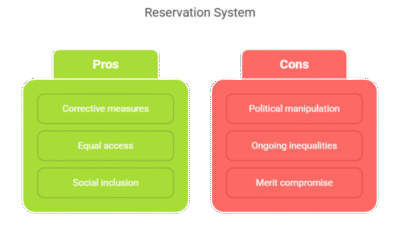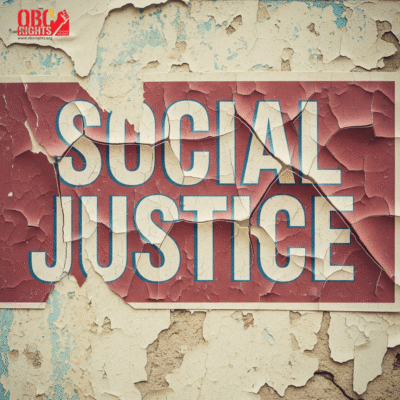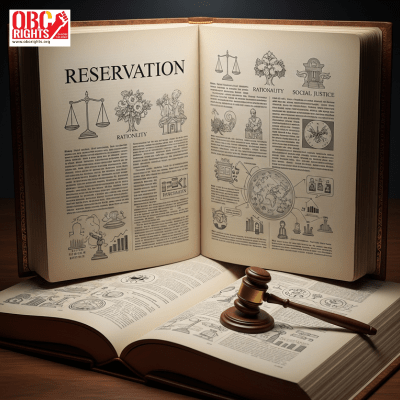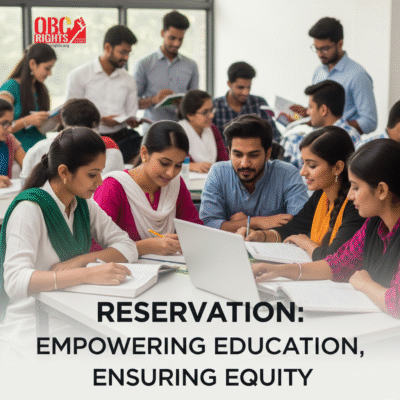The reservation was meant to bring justice to those who were treated unfairly for generations. But today, both the people in power and the common people use the word “social justice” to suit their own needs. Everyone claims either that they are being left out or deserve more.
One key reason for this confusion is the lack of contemporary, reliable data, especially in terms of caste. In this situation, the real meaning of social justice is getting lost. Are we really helping those who need it the most, or just using the idea of justice as a tool for power and politics?
The Original Purpose of the Reservation
At the time of drafting the Indian Constitution, visionary leaders such as Dr. B.R. Ambedkar introduced reservation as a way to support people who had been treated unfairly for centuries. It was never meant to be permanent, but it was necessary to give equal opportunities to those who had none or were oppressed and deprived of their right/fair opportunities in education and government jobs.
Changing Narratives
Reservation was introduced to support communities that had faced injustice for generations. These groups struggled for years to get fair access to education, jobs, and respect in society. But even today, many of them are living in poor and unequal conditions, and continue to face discrimination and a lack of opportunity.
This injustice to the aforesaid marginalized section of people raises the following pertinent question: Are we still focusing on those who truly need support, or are we slowly moving away from the original goal of social justice?
When Everyone Claims Injustice, Who Gets Justice?
Today, both the ruled and the rulers use the language of Social Justice. Some want caste-based reservation, others want economic-based quotas. Everyone believes they are being left out. But if we don’t have an updated Caste Census, how do we measure who’s truly underrepresented? Who didn’t have access to higher education?
Is It Still About Justice?
Reservation aimed to bring equality within society. But today, it’s often used as a political tool to get votes. Governments offer quotas to gain votes, not always to uplift the underprivileged. As a result, the idea of social justice becomes blurred. It turns into a slogan, not a solution.

1. Merit vs Reservation: A Misunderstood Battle
Myth: Reservation kills merit.
Reality: This is often claimed by those opposing reservations (including some in power), but it ignores the unequal starting lines in education, wealth, and opportunity. True merit can only exist when everyone has a fair chance to compete. There cannot be a Competition between Equals and Unequals.
2. Economic Backwardness is Equal to Social Backwardness
Myth: If a person is poor, they are backward.
Reality: While poverty matters, social backwardness includes discrimination, exclusion, and historical injustice—something money alone doesn’t solve. Rulers often blur this line to expand reservations for political gain. Real backwardness is only backwardness in education, knowledge, and lack of share in Government administration. Monet alone can never give a permanent solution to the sufferings of the marginalized.
- Still Waiting for Equality
Myth: The Reservation has served its purpose.
Reality: Many still face caste-based discrimination, limited access to education, and social exclusion, especially in rural areas. Any such claims that the reservation served its purpose show the claimant’s ignorance or intention is malicious.
- Not a Shortcut, But a Struggle
Myth: People get jobs or college seats without effort.
Reality: Most beneficiaries still work hard, often harder, because of the poor schooling systems and social pressure. The myth of the shortcut is spread to discredit the system. The policy of reservation never compromises efficiency.
3. It Was a Temporary Fix
Myth: The Reservation was meant to last only a few years.
Reality: The Constitution allowed for review, not automatic expiry. As long as inequalities persist, so does the need for corrective measures. Induction of Article 340 in the Constitution of Indian paves the way for the Review System.
4. Reservation Means Compromising Merit
Myth: Giving reserved seats means less qualified candidates.
Reality: This ignores unequal starting points. Merit can’t be fairly judged without ensuring equal access and opportunity to quality education and opportunity.
Social Justice: Promise or Performance?
In the name of social justice, political parties often make tall promises, even without understanding the vision of the ‘Reservation Policy’. The term becomes a slogan during elections but fades when it’s time for implementation. The rulers speak of social justice, but their actions often maintain the status quo. Policies are shaped to secure votes, and not to uplift the most marginalized.
Meanwhile, the ruled—particularly the backward communities—are still waiting for justice. The light is not near. Token measures are offered, but deep-rooted inequalities in education, healthcare, and employment remain untouched.
Conclusion
The ruled—the backward and marginalized—still wait for equal access, dignity, and opportunity. Meanwhile, the rulers often use the language of social justice to protect their privilege, not to share it. Social justice is never meant to be a slogan—it was meant to be a promise and assurance, unless that promise is fulfilled for those most excluded, any claim of social justice remains nothing more than a myth. So let’s ask ourselves: have we truly created equal opportunity for everyone in this country? – It’s ‘Not’.



